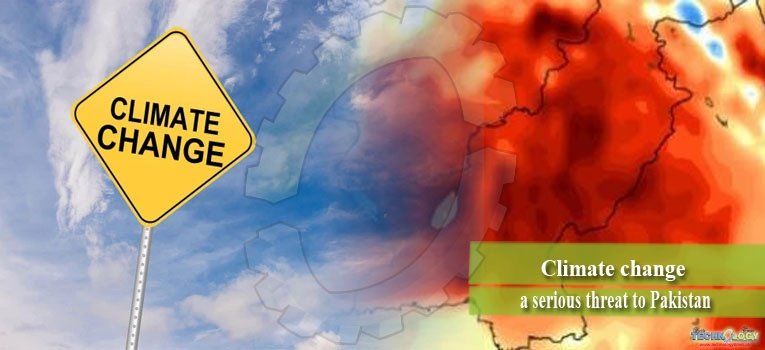Climate change is really one of the gravest environmental issues, Pakistan is facing these days. The frequency of erratic weather patterns, flash floods, high temperatures, glacial melting, heatwaves and health problems is increasing at alarming rate in the country. In fact, Pakistan comes under the list of top 10 most affected countries to climate change.

According to German watch latest Global Climate Change Risk Index (GCCRI) 2018, “Pakistan is 7th most vulnerable country to climate change. In addition, climate change has claimed 10, 462 deaths in 20 years with a death toll of 521.3 lives per year. It has caused economic losses worth $ 3.8 billion dollars, equivalent to 0.605 percent of GDP in 20 year period. Since 1996 to date Pakistan has witnessed over 140 extreme weather events. Cyclones, storms, heatwaves and glacial lake outburst floods (GLOFs) are one of them.”
Impacts of climate change
There is no denying the fact that climate change has caused irreversible harm in Pakistan in short span of time. It has undoubtedly aggravated the situation by triggering rising temperatures, heatwaves, melting of glaciers and flash floods. It has also adversely affected water availability and food security. Consequently, it is leading to droughts, agricultural decline and livestock death.
David Eckstein, one of the main authors of GCCRI report stated that “Pakistan has been continuously bearing the brunt of climate change over couple of past years. Pakistan due to its geographic location has been frequently affected from heavy monsoons in the past. Over last 20 years, if we look at extreme weather patterns in Pakistan. Heavy rains have badly affected the lives and livelihoods of people.
Whereas, floods have severely resulted in agricultural collapse. Plus, heatwaves have posed a serious threat to the peoples’ lives.” An other German Watch report on Climate change states that the super floods of 2018 have placed Pakistan on the top slot among countries most affected by climate change as it lost $ 28.3 billions dollars and 5.4 per cent GDP.
It is believed that crops productivity and agricultural yields have decreased because of adverse effects of climate change. According to Ministry of Climate Change, agriculture, food security and livestock in Pakistan are massively threatened due to increased heat, prolonged droughts and floods. Experts caution, an increase of 1 degree Celsius in mean temperature may reduce wheat yield by 5 to 7 percent.
Whereas, Asian Development bank is of the view that “climatic changes are anticipated to have wide-ranging impacts on country’s agricultural productivity and water availability. To add, the agriculture sector will lose 15 dollars per annum due to climate change by the end of 21st century.”
Global warming and high temperatures are also picking unprecedented pace in Pakistan owing to climate change. Keeping view 53.5 °C temperature was recorded in Turbat on May 28, 2017. It was really the highest temperature witnessed in the history of Pakistan and in world for the month of May. Rising temperatures have truly accelerated glacial melting in the country. Currently, glacial melt, sea level rise, floods, higher frequency of droughts are among major global warming-caused risks faced by Pakistan.
There is no doubt that Pakistan is semi-arid country and the Indus River is its lifeline. Indus river is one of the longest and glacial-fed rivers in Asia. It supports biodiversity, ecosystems of temperate forests and country’s food systems. Pakistan’s socio-economic, environmental and ecological sustainability lie the sustained flows of this river.
But the fact is that glaciers in Karakoram mountain range in upper Indus Basin are melting rapidly. A conference on Climate Change Science and Policy (held in February 2018) revealed that Indus river gets roughly 40 per cent of its water from snow and glacial melt in northern mountains. Scientists in the conference warned that soaring temperatures will intensify melting of permanent ice and glaciers in northern mountain areas.
Ultimately, it double the amount of water in the Indus river in next 40 years’ spell. As a result, this will lead to widespread flooding, inundation of agricultural lands (crops), cities, damage of infrastructure, stoppage of energy supplies, industry, production of food and outbreak of deadly diseases and loss of human lives.
Root causes of climate change
There are several factors that are exacerbating the issue of climate change in Pakistan. But burning of fossil fuels, green house effect, deforestation and industrialization are of the chief causes behind this scourge. Chopping of trees is on the rise in Pakistan. Despite the fact that they play the crucial role in absorbing corban dioxide (CO2) and keep atmosphere cool. These harmful activities primarily fossil fuels and deforestation are massively contributing in the emission Carbon Dioxide.
In turn, that are warming earth’s atmosphere. Industrialization is an other contributor of green house gases. Excessive use of fossil fuels in industries are also adding CO2 in atmosphere, polluting air and creating climatic changes. Scientists warn that if suitable action is not taken in this regard. These changes will wreck havoc on food and water supplies and bring devastating climate events such as heatwaves, flooding and storms in the country.
Recommendations
Thus, there is need of an hour to come up with a master plan to tackle climate change in the efficient and timely manner. We direly need to use renewable sources of energy and lessen the use of fossil fuels. Pakistan has just four percent forest cover which is depleting with each passing day due to rapid deforestation. Therefore, government must ban this brazen act and initiate plantation campaigns across Pakistan.
Reforestation can be the first step towards lowering greenhouse gases from atmosphere. Pakistan should devise climate adaption and mitigation agendas and think of reducing its poisonous gas emissions. This can be done through reforestation and investment in the low-corban releasing technologies. In doing so, Pakistan can certainly combat the menace of climate change to great extent.
The writer is freelance columnist, an undergraduate student of Economics at University of Sindh, Jamshoro and aspirant to CSS, based in Dadu, Sindh. He can be reached at assadbaloch24@gmail.com